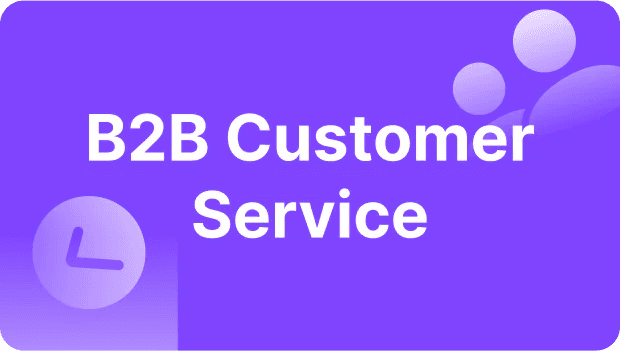Share
0
/5
(
0
)
The success and performance of a business are directly linked to the quality of services or products it offers its customers. Despite the desire of each company to offer only the best experience of cooperation, sometimes, especially in the B2B sector, it can be challenging. However, certain practices significantly help you deliver exceptional service to B2B customers.
This article will guide you through the world of finance and explain what B2B customer service is and why it is essential when multiple companies collaborate. You will also learn about B2B customer service best practices used today to maintain high conversion rates of new leads and the satisfaction of existing customers.
Key Takeaways
B2B customer service is an important component of cooperation between several companies, providing comprehensive support within its framework.
B2B customer service is important because it helps maintain market reputation and company value, reduces customer churn and improves customer lifecycle value.
Best practices for improving the B2B customer experience include implementing CRM products, providing post-sales support, and using automated customer support systems.
What is B2B Customer Service?
Business-to-Business (B2B) customer service refers to the assistance and support a business provides to other businesses that use its products or services.
This support may entail addressing technical issues, facilitating onboarding or account creation for new employees, upgrading tools as necessary, or managing returns or exchanges of defective products.
The aim of B2B customer service is to ensure that businesses can efficiently and effectively use the products or services they have purchased for their operations. Effective B2B customer service is essential to building and maintaining strong relationships between businesses.
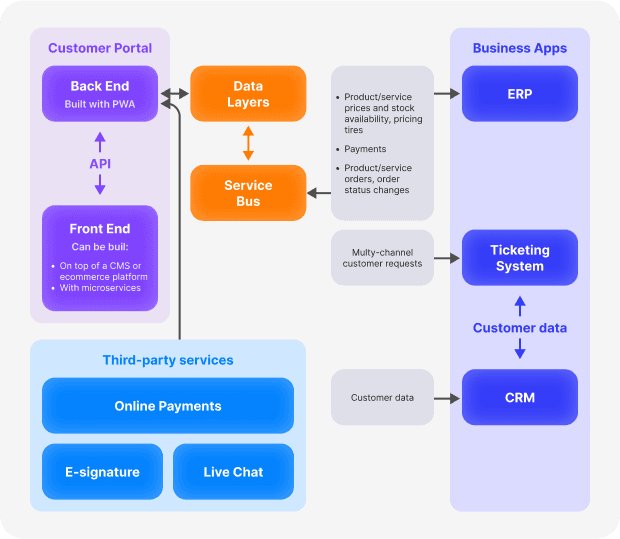
In contrast to the more transactional nature of Business-to-Consumer (B2C) interactions, Business-to-Business (B2B) relationships often span longer periods, involve complex contracts, and require a deeper level of engagement.
In B2B interactions, the focus is not on resolving a one-time issue or making another sale but on nurturing and sustaining a partnership. This entails a continuous effort to build and maintain a mutually beneficial relationship that can withstand the test of time.
As such, B2B interactions require a high level of commitment, effective communication, high-quality software to work with customer data and a clear understanding of the expectations and obligations of each party involved.
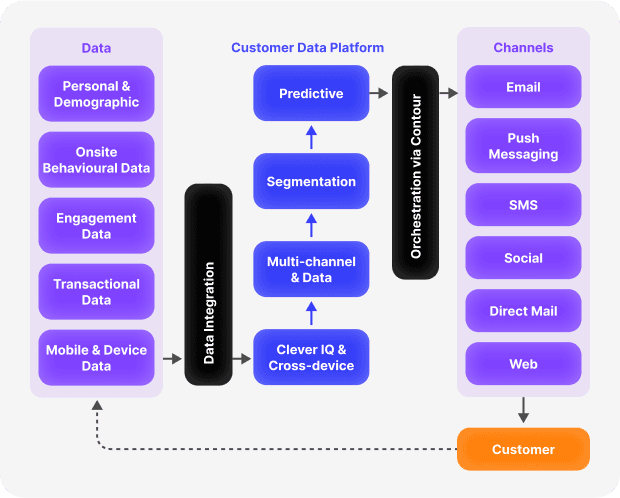
In the B2B customer service industry, the purchased product or service often forms the backbone of the customer's business operations. Therefore, any issues faced by the customer should be resolved promptly and effectively.
It is imperative that not only the product or service is of high quality, but the customer care is also on par with the same standards. This is not merely a recommendation but a necessity for businesses to thrive and excel in this competitive industry.
Why is B2B Customer Service Essential?
B2B agencies may not constantly interact directly with individual consumers while building their marketing strategies, but their success is closely linked to the relationships they cultivate with other businesses.
The excellence of customer care is a fundamental element in these interactions, as it can determine the perception, trust, and loyalty between businesses. Therefore, B2B customer service is crucial, and there are reasons for that:
1. Market Value and Brand Reputation
The selection of business partners is often influenced by recommendations from peers. A study made by PwC revealed that the loyalty of a brand's customers is tenuous, as even a single negative experience can cause one-third of devoted customers to abandon the company.
The study further found that 92% of clients would permanently sever their ties with a company after two or three negative interactions. These findings underscore the importance of exceptional customer service as a critical driver of customer loyalty and retention.
Business leaders should prioritise strategies to deliver consistent, high-quality experiences to their clients to maintain their customer base and safeguard their reputation.
By providing consistent and excellent customer service, B2B companies can enhance their market value and appeal. This satisfies their clients and increases the likelihood of them recommending the company's services to others.
When clients are happy with the service they receive, they become brand ambassadors and share their positive experiences through testimonials and reviews on various platforms. This, in turn, helps boost the company's standing in the competitive market, as satisfied clients become valuable brand promoters.
2. Customer Outflow Reduction
Identifying the average monthly churn rate and slicing and dicing data to see the effects industry, ARR, business audience, company growth stage, involuntary churn and macroeconomic climate all have on churn rates.
Customer churn is a real problem for B2B companies. According to a report by the global customer advocacy community, The Customer Success Collective, the average monthly customer churn rate in 2023 was 7.2% in the B2B sector across industries, in part due to customers being unable to navigate products.
Therefore, it is logical to argue that by helping customers navigate B2B products and services by providing them with excellent customer service, the likelihood of customer churn will decrease.
3. Investment Return and Customer Lifetime Value
A business's revenue and profit margins can be significantly influenced by a single experienced customer. Therefore, it is paramount to deliver consistent and delightful user service, as it not only ensures contract renewals but also paves the way for additional sales or complementary product recommendations related to other products or services.
Research data has shown that users who have had a positive interaction are inclined to spend up to 140% more than those who have experienced unfavourable contacts. Therefore, investing time in nurturing these relationships can yield long-term benefits.
B2B vs. B2C Customer Service — What is The Difference?
The nature of business for B2B (business-to-business) and B2C (business-to-consumer) companies is entirely distinct. They have diverse budgets and varied expectations regarding turnaround, and they cater to different kinds of clients.
B2C companies deal directly with end-users, while B2B companies deal with suppliers and dealers. Hence, the requirements and issues both types of businesses face can vary.
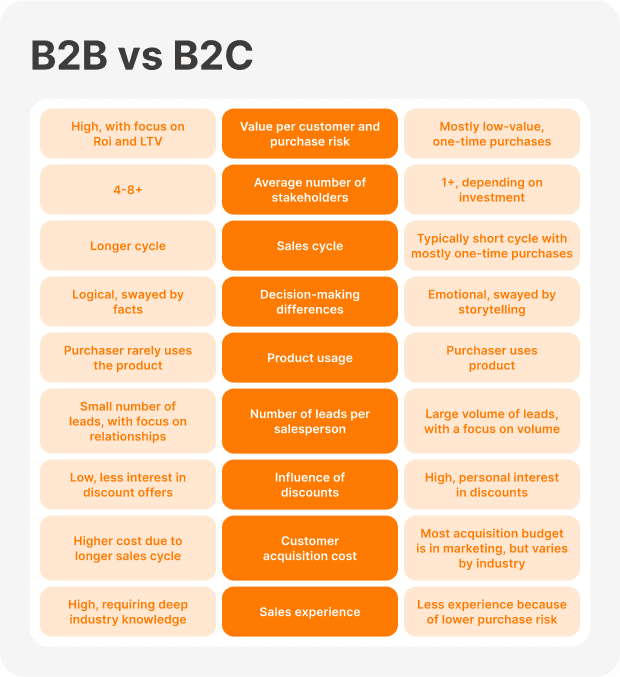
The fundamental concept of customer service remains the same regardless of the industry: providing outstanding assistance and cultivating constructive connections. However, the nuances of B2B and B2C interactions may differ significantly. The following are the distinguishing characteristics that set them apart:
Relationship's Nature
In B2B customer service, the key focus is cultivating and sustaining long-term relationships with clients to secure B2B client acquisition and retention. Such efforts entail proactive, consistent, and frequently scheduled interactions.
This may manifest as frequent check-ins during the onboarding process, monthly or quarterly reviews of their business, and annual meetings.
These interactions may occur virtually or in person, depending on the nature of the engagement. The goal is to maintain a robust client relationship, which remains paramount to achieving business objectives.
Although securing repeat business is always desirable, B2C interactions tend to be more transactional, with customers engaging on an as-needed basis. In many instances, B2C customer service interactions are limited to phone, chat, or email inquiries.
Customer Engagement Depth
Business-to-business (B2B) enterprises have traditionally relied on conventional engagement methods, such as sales calls, conferences, trade shows, and networking.
Forbes suggests that B2B sellers should invest substantial time cultivating their relationships with potential buyers. This may necessitate presenting proposals formally or contacting multiple individuals within the organisation by phone.
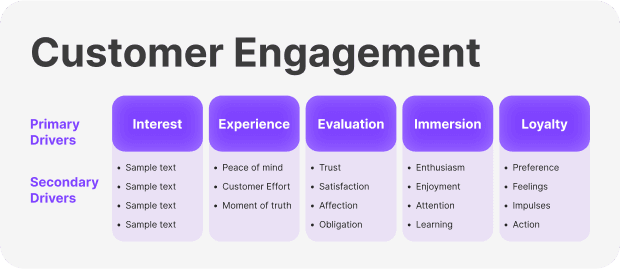
In recent years, B2B customer engagement has transformed, resembling B2C dynamics to a greater extent. Influencer marketing has emerged as a critical area of focus for B2B marketing teams, with over 70% planning to allocate investments in this domain.
Additionally, social media has gained significant prominence as a marketing tool for B2B companies, with 75% of B2B buyers and 84% of C-suite executives indicating its use in their purchase decisions.
Customer Service
Contemporary customers have a penchant for independent, self-directed customer service. In business-to-customer (B2C) enterprises, individuals seek swift, efficient resolution of inquiries and issues or the ability to connect with a live agent without having to navigate through protracted phone menus or scour multiple web pages. For B2C companies, the emphasis is on empowering customers to help themselves.
B2B transactions are often intricate, costly, and long-term. While self-service options are appreciated, a dedicated support team is essential for addressing client issues. This setup helps reduce frustration and stress when multiple teams use the same account.
It also promotes consistency by managing all requests in a single Customer Relationship Management (CRM) dashboard. Consequently, it is crucial to design customer service in a high-touch and consistent manner, regardless of who seeks help.
Issue Complexity
The complications that B2B customers encounter are notably more intricate than those experienced by B2C customers. A B2C customer, being a solitary individual, may approach you to inquire about the status of their order or ask for a refund, and such concerns entail a manageable amount of complexity.
In contrast to B2C customers, B2B clients may encounter issues requiring more attention and effort to resolve. This may be attributed to the technical nature of B2B goods, which often necessitates the involvement of multiple stakeholders.
Furthermore, the business may rely heavily on the B2B product, elevating the problem to a high-priority issue. As a result, resolving B2B issues necessitates greater expertise and dedication to ensure that the client's needs are met.
Best Practices for B2B Customer Experience
In today's contemporary world, the significance of customer experience cannot be overstated. Beyond price or product quality, experience is rapidly emerging as the most critical differentiating factor for winning customers, even in Business-to-Business B2B transactions.
Thus, according to a recent study conducted by Deloitte, customers appreciate and prioritise the experiences provided by the businesses they work with. This appreciation is directly linked to growth and profit margins.
As the space becomes increasingly competitive, businesses must prioritise their customers' satisfaction with the service they receive. In the event a customer is dissatisfied, they hold the option to take their business elsewhere.
Therefore, B2B companies must focus on creating an exceptional customer experience that incentivises customers to continue doing business with them. Implementing B2B customer service best practices is crucial in achieving this objective.
1. Customer Relationship Management Integration
In business-to-business sales and customer support, agents must possess the most current information about customers. By leveraging this information, support agents can deliver consistently valuable customer interactions at opportune moments. Such an approach fosters increased customer satisfaction and retention while driving business growth.
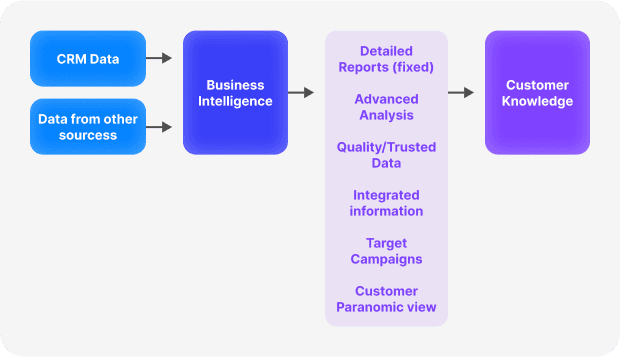
In the context of B2B customer experience management through CRM systems and customer support services, it is common for these two functions to be managed separately, resulting in a potential time lag when retrieving customer information.
This issue can be addressed by integrating CRM and customer support tools, enabling agents to access all relevant customer information from a single location. Such integration would facilitate a streamlined process, reducing the likelihood of agents inadvertently conveying conflicting messages to the wrong parties.
2. Customer Support Customisation
To provide excellent customer support, it is crucial to have a deep understanding of the customer. This involves recognising their needs, preferences, characteristics, and behaviours so that you can offer a personalised service.
For instance, in a B2B environment, a buyer may have multiple stakeholders, different user demographics, and varying contact points. By knowing your customers and providing customised support, you demonstrate the value you place on them.
Because customers prefer to communicate through multiple channels, it is essential to have a consistent omnichannel support system in place.
Your organisation should strive to provide a coherent experience across all touchpoints, including your website, social media accounts, and other platforms. Doing so can minimise response times and establish a sense of reliability and confidence with your customers.
3. Automated Customer Support Tools Utilisation
Your business needs practical customer support tools to improve customer satisfaction. One example of such a tool is an automated live chat feature on your product landing pages. These self-service options can assist customers who require real-time assistance with research or troubleshooting simple FAQs.
When you have access to the right technology, you can enhance the quality of support your company provides. Smaller businesses may find it easier to offer good customer support by automating their processes to improve operations. For instance, a live chat tool can make it easier to collect customer contact information or other data from them.
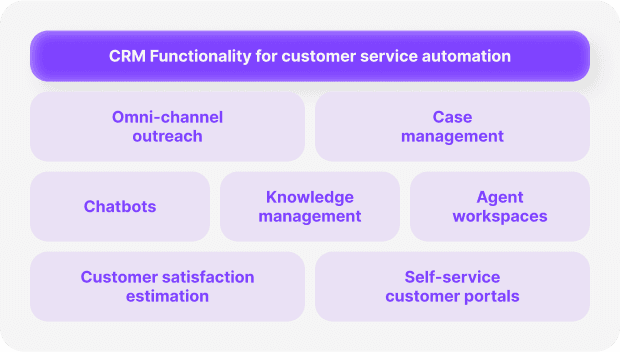
Live chat automation has enabled staff to offer more personalised experiences to customers at the appropriate time. The captured data can prove helpful in effectively closing sales deals and driving specific actions through interactive content engagement.
Automated ticketing systems can also assist in saving support team time by directing inquiries to dedicated account managers responsible for handling tickets related to specific accounts.
4. Efficient Collaboration
As mentioned previously, B2B customer issues can often involve the collaboration of multiple teams. Depending on the complexity of the problem, it can take time to resolve it efficiently, as different departments may need to be involved.
However, with cloud-based tools, your workforce can be mobile, and even remote teams can use team collaboration tools to work together. This can help your support teams reduce the time required to address support tickets and increase productivity.
Efficient collaboration in fixing B2B customer issues requires effective communication. Nowadays, it's common for customer support team members to work remotely. While there are challenges to having a partially remote workforce, software solutions can help keep communication lines clear and shorten response times. Some examples are report design tools and VoIP tools.
5. Customer-Centricity
By emphasising customer-centricity, your customer support teams can proactively address customer issues. This type of strategy is part of a more comprehensive business model driven by customer experience (CX).
After a sale, this approach to continued customer support can build a closer relationship between your business and your customer. Using customer feedback, you can develop your knowledge base and be better positioned to respond to customer needs.
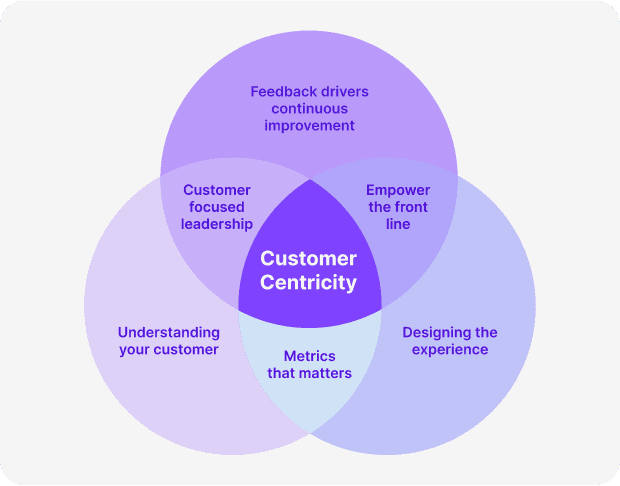
For that reason, it is increasingly common to see customer success teams after the point of sale. This approach to support means your departments can streamline queries by customers. It gives your company a competitive edge by showcasing your productivity.
In fact, B2B companies that excel at CX can see an increase of up to 20% in customer satisfaction- translating to a 10% increase in growth.
6. Post-Purchase Support
In business-to-business (B2B) commerce, customer satisfaction is not limited to the point of purchase. Instead, customers seek long-term relationships with reliable suppliers who can offer post-purchase support.
In this context, providing valuable service to customers is crucial for building lasting relationships. Adequate post-purchase support entails more than just ensuring customer satisfaction with their purchases.
It involves helping customers optimise their use of products, work more efficiently, and continually meet their evolving needs. By providing such support, companies can build trust and foster customer loyalty.
7. Procurement
In B2B procurement, various stages must be manoeuvred before a successful purchase can be made. Around 60% of B2B transactions typically involve more than four entities, including champions, influencers, decision-makers, users, or ratifiers.
It is in the best interest of both the seller and the buyer to have a streamlined and expeditious procurement process to enhance sales and customer satisfaction.
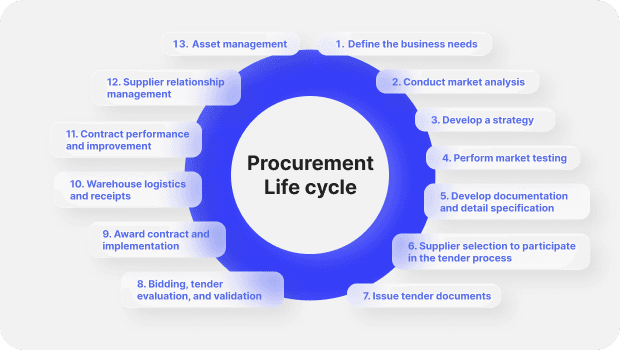
A growing number of buyers in the B2B space are expressing a desire for self-service purchasing options. In fact, between 70% and 80% of decision-makers in this industry now prefer remote human interaction or self-service options.
This trend is also observed in high-value transactions, with McKinsey reporting that even deals exceeding one million dollars have a market for self-service interactions.
8. Collect Customer Feedback
Acquiring customer feedback is vital in determining a company's success and growth trajectory. The insights gleaned from such feedback serve as a guiding resource for businesses to optimise their operations and improve their customer satisfaction rates.
As a responsible business entity, it is imperative to understand what aspects of one's business resonate positively with customers and what areas require improvement. The value of customer feedback must be balanced, and its judicious utilisation can significantly contribute to the long-term success of any enterprise.
Conclusion
Best practices for B2B customer service refer to the set of guidelines and strategies that businesses follow to provide high-quality customer support to other companies.
These practices aim to improve customer satisfaction, retention, and loyalty, including active listening, personalised communication, efficient issue resolution, and timely follow-up.
By implementing these best practices, B2B companies can establish a reputation as reliable and trustworthy partners, gain a competitive edge in the market, and ultimately drive growth and success.
FAQ
What is B2B customer service?
It is the process of providing timely, complete and correct assistance to customers by companies with questions or situations in which they have difficulties.
What is the difference between B2B and B2C customer service?
The main differences between the two models include the form of the relationship between the actors, the degree of customer involvement in the company's processes, and the customer support process.
What is the purpose of implementing B2B customer service practices?
Any practices used in the B2B as well as the B2C sphere are used for one thing — customer retention. On the other hand, they can also be actively used to attract new customers.
Read also

